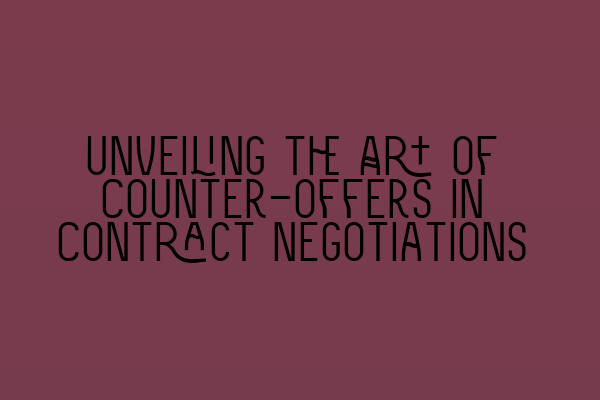Unveiling the Art of Counter-offers in Contract Negotiations
Contract negotiations are a critical part of the legal process, where parties come together to establish the terms and conditions of an agreement. During these negotiations, counter-offers often play a significant role in shaping the final contract. Understanding the art of counter-offers can give solicitors a competitive edge and lead to optimal outcomes for their clients. In this blog post, we will delve into the intricacies of counter-offers and explore how they can be used effectively in contract negotiations.
The Power of Counter-offers
A counter-offer is a response to an offer made by the other party. It indicates a willingness to negotiate and suggests alternative terms or conditions that could lead to a mutually acceptable agreement. Counter-offers can be powerful tools as they allow parties to tailor the terms of an agreement to their specific needs, creating a more balanced and satisfactory outcome for both sides.
However, it is essential to approach counter-offers strategically to ensure their effectiveness. Here are some key considerations:
1. Analyzing the Original Offer
Before drafting a counter-offer, solicitors must thoroughly analyze the original offer. This includes understanding its terms, conditions, and implications for their client. By assessing the strengths and weaknesses of the offer, solicitors can identify areas for negotiation and craft a counter-offer that addresses their client’s interests.
2. Evaluating Client Objectives
Client objectives should guide the formulation of counter-offers. Solicitors must have a clear understanding of their client’s goals, priorities, and thresholds. This enables them to propose alternative terms that not only protect their client’s interests but also align with their desired outcomes. It is crucial to balance assertiveness with flexibility to foster a constructive negotiation process.
3. Crafting a Persuasive Counter-offer
A well-crafted counter-offer can significantly impact the negotiation process. Solicitors should focus on presenting alternative terms that are reasonable, supported by legal principles, and directly address their client’s concerns. Building a compelling argument backed by solid legal reasoning increases the chances of the counter-offer being accepted or, at the very least, initiating further negotiations.
4. Anticipating Counter-counter-offers
In the intricacies of contract negotiations, it is common for counter-offers to generate further counter-counter-offers. Solicitors need to anticipate these responses and have a plan in place. By considering possible outcomes and preparing alternative strategies, they can navigate the negotiation process more effectively and respond to counter-counter-offers in a timely and thoughtful manner.
The Role of Communication
Effective communication is a linchpin in successful contract negotiations. When it comes to counter-offers, solicitors must ensure their clients’ viewpoints are clearly and persuasively conveyed. Here are some communication strategies to employ:
1. Written Communication
Counter-offers are typically conveyed in written form, such as letters or emails. Solicitors must draft these communications with precision, ensuring they are well-structured, concise, and courteous. By highlighting the benefits and justifications for the proposed alternative terms, solicitors can significantly influence the other party’s perception and create a solid basis for constructive negotiation.
2. Verbal Communication
During face-to-face meetings or telephone conversations, solicitors should leverage their persuasive skills to convey the reasons behind the counter-offer. Articulating the legal basis, reasons for the proposed changes, and potential advantages to both parties can make a significant impact on the negotiation process. Active listening and responding thoughtfully to the other party’s concerns are equally important in promoting a productive dialogue.
Conclusion
Counter-offers are an essential part of the contract negotiation process. By approaching them strategically and employing effective communication strategies, solicitors can maximize their clients’ chances of achieving favorable outcomes. The art of crafting persuasive counter-offers requires a deep understanding of the original offer, client objectives, and the ability to anticipate and respond to counter-counter-offers. By mastering this art, solicitors can serve their clients with confidence and skill, ensuring optimal results in contract negotiations.
Related Articles:
